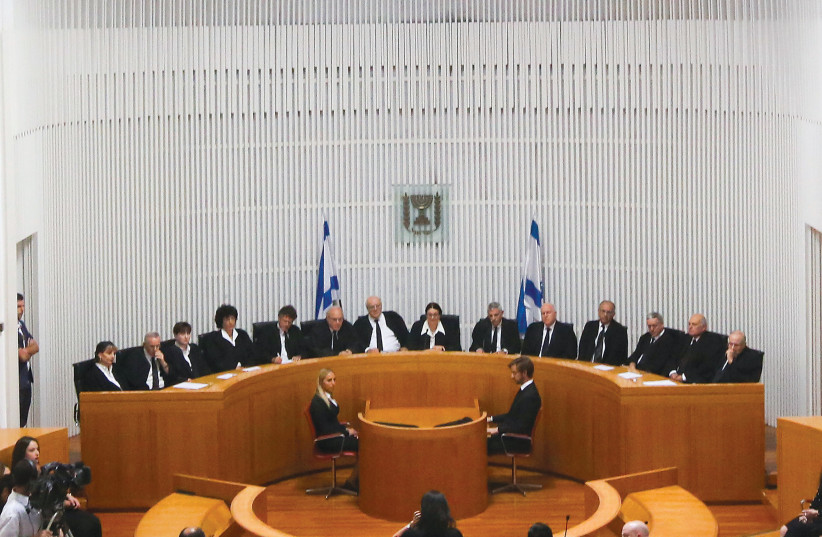The coalition is committed to continuing legislation of its proposed judicial reforms if negotiations at the President’s Residence fail, Knesset Constitution, Law and Justice chairman Simcha Rothman (Religious Zionist Party) said Monday.
“The ball is currently in the hands of the opposition,” he told Channel 12. “Our hands are outstretched for negotiations, but unfortunately, it seems that the opposition is interested in an explosion [in the talks].”
“Despite our strong desire for an agreed-upon reform, we will not be held hostage by the opposition forever,” he added. “We are committed to advancing the reform, which 64 mandates voted for.”
Rothman’s comments came after a clash on social media between cabinet secretary Yossi Fuchs, who is a member of the coalition’s negotiating team, and National Unity MK Ze’ev Elkin on Monday.
The opposition would not receive its traditional seat on the Judicial Selection Committee if agreements over how its members are chosen are not reached during negotiations at the President’s Residence, Fuchs wrote on Twitter.
The most controversial part of the reform
The Judicial Selection Committee is one of the most controversial parts of the reform. The makeup of the committee since 1953 has included three Supreme Court justices, two representatives of the Israel Bar Association, two ministers and two MKs. The Knesset traditionally chose one MK from the coalition and one from the opposition, but this is not required by law.
The coalition’s proposal is to alter the makeup of the committee so that the government and coalition combined would have a majority in the committee and be able to control how the judges are elected.
The Knesset was supposed to form the committee in March, but it changed the law to give itself until June, hoping that the new makeup of the committee would become law. With the new deadline approaching, however, the coalition reportedly has decided not to delay again and will form the committee based on the existing makeup.
This was a “first victory” for the opposition, Elkin wrote Monday on Twitter.
Fuchs wrote: “I innocently thought that the representatives of your party at the talks at the President’s Residence had real desire to reach agreements over altering the makeup of the Judicial Selection Committee… and not to ‘defeat the coalition,’ and here the truth was exposed.”
If the talks failed, the coalition would break with tradition and occupy both of the Knesset’s spots on the committee, he said.
In response, Elkin wrote: “As opposed to the government, we aspired consistently for dialogue and agreement from the first moment, and we will continue the effort to reach a consensual and balanced reform that will not allow the government complete control of the judicial system. I propose to you not to hold negotiations while threatening to break the tradition in the Knesset in which coalition and opposition representatives were always chosen for the committee, including in the previous Knesset.”
The President’s Residence issued a statement that said the president “clarified and clarifies at every opportunity that there are no winners or losers, and if there will be – then the State of Israel loses.”
The coalition’s decision not to delay the founding of the committee was made at the president’s request to enable the talks to continue, as another delay would have indicated that the coalition still intended to alter the committee’s makeup if no agreements were reached, the statement said.
The president stressed that the justice minister had the authority to convene the committee after its founding, the statement said, implying that as long as the talks were ongoing at the President’s Residence, the committee will not convene.
“The president reiterates his call to avoid expressions with political purposes that do not contribute to reaching broad consensus and stresses that the State of Israel is at a very important and critical point,” the statement said. “The easy act is to blow up the talks, but the price will be unbearable. It is more challenging and harder to arrive at agreements, but this is unquestionably the good of the State of Israel, and with a joint effort it is possible to reach agreements.”
Fuchs later erased his tweet that included the threat not to include an opposition MK in the committee and wrote: “I wish to thank the president for his indefatigable efforts to advance the talks between the coalition and opposition under his auspices. The coalition’s representatives will continue to participate in these talks out of a real wish to reach agreements, despite the difficulties along the way.”
National Unity chairman Benny Gantz on Monday said: “I see the talks that are taking place these days at the President’s Residence as of utmost importance for democracy, our resilience, our security. We hope and are working so that there will be progress, and we constantly remember that reaching agreements that will preserve democracy is critical.”
“If there is someone who plays games, he will harm the citizens of Israel, and he will bear the responsibility and the consequences,” he said at his party’s weekly faction meeting.

